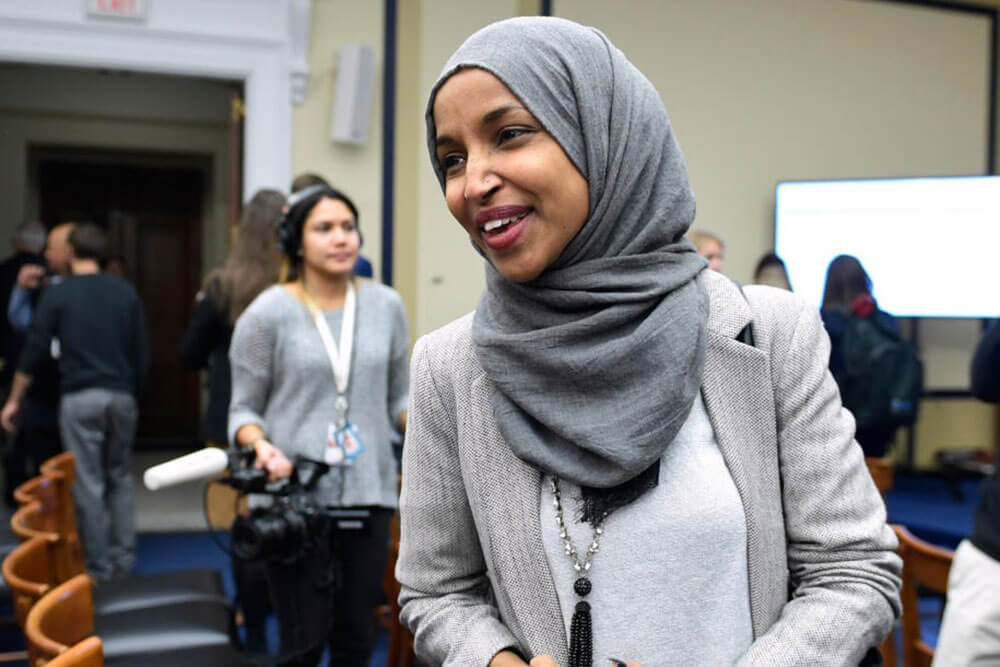Photo: Congresswoman Ilhan Omar.
We at Braver Angels are on a mission to depolarize America. Usually, that means we try to help people have more productive conversations across the acrimonious political divide which currently separates us. It’s important to recognize, though, that the acrimony isn’t restricted to dialogue between members of different groups.
A couple weeks ago I wrote about some internal strife within a progressive community that was engaged in conversations about race. This isn’t really a unique situation, as progressives are extremely self-conscious about their own behavior, especially when it comes to ensuring that everyone in the community has the opportunity to speak their own truth. Progressives tend to be mindful that many of those voices are feeling empowered for the very first time, and that their ideas in particular must be given the space to be heard. And this gets extremely complex when it comes to the topic of intersectionality.
For those not familiar with the concept, intersectionality is a way of thinking that addresses the many interwoven levels of power dynamics that exist within our society, a society that has never really shed its legacy of social stratification. For example, while it’s difficult to be a person of color in a society that has traditionally considered whiteness the default, it’s even more difficult to be a woman of color, and the challenges of being a queer woman of color rise to a whole other level. And so on: one could add in other layers of complexity such as disability, socioeconomic status, and more.
One of the most visible manifestations of the struggle on the left to reckon with the ideas of intersectionality was a conflict within Pantsuit Nation, a liberal group that arose in support of Hillary Clinton’s presidential campaign. The group’s leadership was composed predominantly of white women, and it received criticism that it was ignoring the concerns of other marginalized groups, and simply providing a feel-good outlet for progressives that made no real attempt to effect meaningful change. These critiques often came from women of color.
Pantsuit Nation has made concerted efforts to address these criticisms, including by elevating women of color and queer women to positions of leadership, but many of their detractors remain critical. It’s emblematic of the complex dynamics that exist within many progressive communities whose very identities revolve around the issues of authenticity and true dedication to the cause.
Naturally, many movements experience struggles to define their souls, and in some ways it has echoes of conflicts on the right, in which more moderate members of the GOP have been branded as “RINOs,” or “Republicans In Name Only,” throughout much of the history of that party. Struggles over group identity are not unique to the left.
But the dynamic on the left is made more interesting by the emphasis, inherent in modern progressivism, on protecting others’ points of view to help remedy their previously silenced status. Individuals on the left must take this into account, and balance it, alongside advancing their own perspectives. Many in the movement are also distinctly aware of norms regarding communication styles, and insist that those who have been the most victimized should be given the most leeway in terms of self-expression.
My conversation with Rupa Ray from Phans for Racial Equity, about her experiences in that group, gave me a fascinating look at her own intellectual evolution on this topic. As an administrator within that group, she was initially most concerned with moderating its conversations to ensure that everyone felt safe to express themselves, without the threat of backlash, or the questioning of their sincerity or intent.
This task proved more complex than expected, though, as members began to discuss whether it was appropriate to censor the language of the more passionate members of the group, particularly people of color who felt they had a more tangible stake in the conversation.
Rupa would hear from white members of the group who claimed that other members, people of color, refused to maintain the same sort of calm countenance that they did.
“Well maybe that other person isn’t able to remain calm because they’re affected in a way that you’re not – and maybe that you can’t even imagine,” she says she wanted to respond. “I wouldn’t call the ability to remain calm as a virtue, but more as a product of white privilege.”
The idea of white people policing the tone of people of color isn’t at all new. It was a prominent theme in Dr. Martin Luther King, Jr.’s Letter from a Birmingham Jail, in which he lamented the attitude of the “white moderate” who might agree with the goals of the civil rights movement, but “who prefers a negative peace which is the absence of tension to a positive peace which is the presence of justice.”
And tone-policing is an ever-present question in the background of many debates within progressive circles. Rupa’s own thinking on this subject has shifted over time, with her concern for civility giving way to a feeling that more people need to be exposed to the anger and frustration of disempowered groups, in order to recognize the scope of the problem.
It also speaks to the inherent tension that some progressives feel with the mission of Braver Angels. We encourage workshop participants to speak in a manner that keeps the temperature down so that the message isn’t drowned out by stridency of style. We counsel people to mitigate the strength of their statements by emphasizing that it’s merely their perspective, and leaving room for other people’s lived experience which may be much different.
But people who have had their voices ignored for generations certainly have a right to their annoyance when told that their anger isn’t productive, or when more privileged groups tell them that their struggle is subjective.
These dynamics become even more fraught when the interests of two marginalized groups conflict, as some believe was the case when Rep. Ilhan Omar, one of the first two Muslim women elected to Congress, earned strong rebukes from her own Democratic party for comments that were seen by some as anti-Semitic.
Persecution of the Jewish people was thought by many—including me, a secular Jew—to have been relegated to the past. But anti-Semitism has certainly been rearing its head recently around the world, including among the American alt-right movement, whose adherents chanted “Jews will not replace us” at their rally in Charlottesville, Virginia, in 2017.
There are also accusations of anti-Jewish bias against supporters of the BDS movement on the left. But here it gets more complicated, since the Palestinians who have been the fiercest advocates of the movement to boycott, divest from and sanction the state of Israel are also among the marginalized people of the world.
In progressive conversations on Facebook about the accusation against Rep. Omar, there are many perspectives from people of many identities. These include Jews[1], people of color, and white people, with representatives from all groups on both sides of the issue. There is intense focus on where the line is drawn between criticism of the policies and actions of the government of Israel and criticism of the very existence of the state of Israel, the latter of which is seen by some as inherently anti-Semitic.
Some claim that accusing Jewish groups like AIPAC of peddling financial influence over systems of power, as Omar did, is a rehash of an anti-Semitic trope. She also accused Israel of having “hypnotized the world,” a version of another trope which has its own connections to previous instances of anti-Jewish ideologies. Others see her criticisms as legitimate, and point out that many black leaders are being silenced due to perceptions of anti-Semitism.
In one of the more thoughtful reactions to the controversy, author Ijeoma Oluo began, “I do believe that there has been an organized effort to punish activists and public figures – especially black activists and public figures – who speak out in support of the Palestinian people.”
But she emphasized that the specter of anti-Semitism is real: “I do not believe that Israel is interchangeable with the Jewish people. I do not believe that Jewish Americans are to be held accountable for the actions of the Israeli state. I do not believe that there is some vast worldwide Jewish conspiracy of any sort, about any thing. Such beliefs are anti-Semitic. I believe that we can discuss Israel without being anti-Semitic and we must.”
Many contributions to the conversation online lack this sense of nuance, though, and there are constant accusations of arguing in bad faith, as people on both sides refuse to see how the claims of the other could stem from an honest intellectual argument. In one of the classic signs of a discussion going off the rails, there have been assertions that people who espouse a certain viewpoint don’t belong in the progressive community.
How can we bridge the divide between people with such varied and deep ideological differences as Republicans and Democrats, when that goal proves elusive even for interlocutors who share common cause on most things? Perhaps it’s just useful to recognize that there’s room in the conversation for many different levels of discourse, from the overtly measured to the deeply passionate.
“The existence of an organization like Braver Angels has an important and valid place in our discourse that’s irreplaceable,” Rupa told me. “But, in parallel, there’s an equally valid place for people of color like me who are finding, for the first time, a positive way to experience an anger that they have never been able to experience before, which is healing and empowering in a very beneficial way.”
[1] Jews as an ethnic group as distinct from the Jewish religion is another “complexifier,” as Jeff Bezos would say. As with many groups who are considered “white” now, like Italians and Irish, we were not considered to be in that group when the first wave of our immigrant ancestors came to the U.S.




